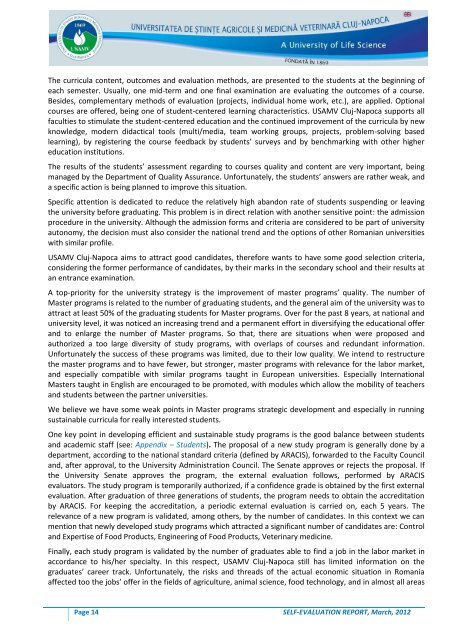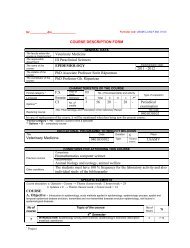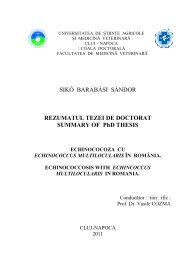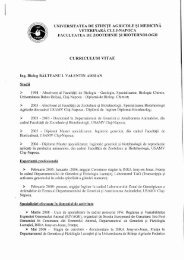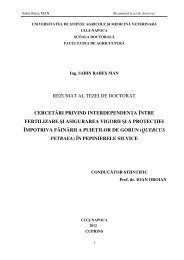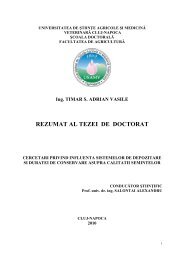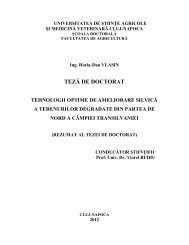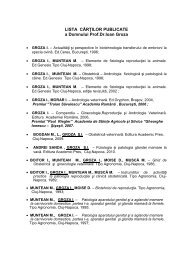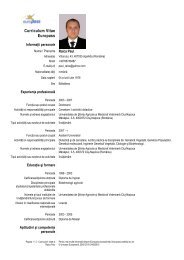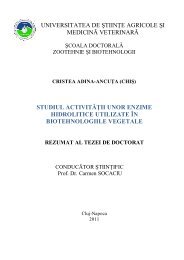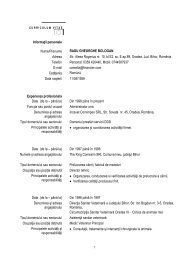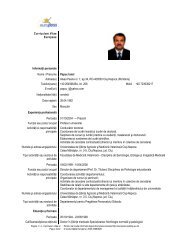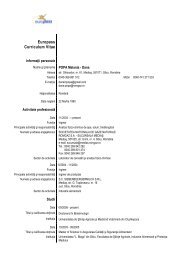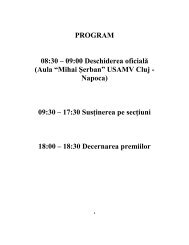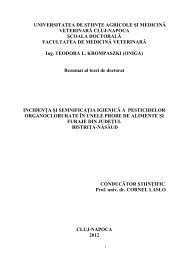self evaluation report - Universitatea de Ştiinţe Agricole şi Medicină ...
self evaluation report - Universitatea de Ştiinţe Agricole şi Medicină ...
self evaluation report - Universitatea de Ştiinţe Agricole şi Medicină ...
You also want an ePaper? Increase the reach of your titles
YUMPU automatically turns print PDFs into web optimized ePapers that Google loves.
The curricula content, outcomes and <strong>evaluation</strong> methods, are presented to the stu<strong>de</strong>nts at the beginning of<br />
each semester. Usually, one mid-term and one final examination are evaluating the outcomes of a course.<br />
Besi<strong>de</strong>s, complementary methods of <strong>evaluation</strong> (projects, individual home work, etc.), are applied. Optional<br />
courses are offered, being one of stu<strong>de</strong>nt-centered learning characteristics. USAMV Cluj-Napoca supports all<br />
faculties to stimulate the stu<strong>de</strong>nt-centered education and the continued improvement of the curricula by new<br />
knowledge, mo<strong>de</strong>rn didactical tools (multi/media, team working groups, projects, problem-solving based<br />
learning), by registering the course feedback by stu<strong>de</strong>nts’ surveys and by benchmarking with other higher<br />
education institutions.<br />
The results of the stu<strong>de</strong>nts’ assessment regarding to courses quality and content are very important, being<br />
managed by the Department of Quality Assurance. Unfortunately, the stu<strong>de</strong>nts’ answers are rather weak, and<br />
a specific action is being planned to improve this situation.<br />
Specific attention is <strong>de</strong>dicated to reduce the relatively high abandon rate of stu<strong>de</strong>nts suspending or leaving<br />
the university before graduating. This problem is in direct relation with another sensitive point: the admission<br />
procedure in the university. Although the admission forms and criteria are consi<strong>de</strong>red to be part of university<br />
autonomy, the <strong>de</strong>cision must also consi<strong>de</strong>r the national trend and the options of other Romanian universities<br />
with similar profile.<br />
USAMV Cluj-Napoca aims to attract good candidates, therefore wants to have some good selection criteria,<br />
consi<strong>de</strong>ring the former performance of candidates, by their marks in the secondary school and their results at<br />
an entrance examination.<br />
A top-priority for the university strategy is the improvement of master programs’ quality. The number of<br />
Master programs is related to the number of graduating stu<strong>de</strong>nts, and the general aim of the university was to<br />
attract at least 50% of the graduating stu<strong>de</strong>nts for Master programs. Over for the past 8 years, at national and<br />
university level, it was noticed an increasing trend and a permanent effort in diversifying the educational offer<br />
and to enlarge the number of Master programs. So that, there are situations when were proposed and<br />
authorized a too large diversity of study programs, with overlaps of courses and redundant information.<br />
Unfortunately the success of these programs was limited, due to their low quality. We intend to restructure<br />
the master programs and to have fewer, but stronger, master programs with relevance for the labor market,<br />
and especially compatible with similar programs taught in European universities. Especially International<br />
Masters taught in English are encouraged to be promoted, with modules which allow the mobility of teachers<br />
and stu<strong>de</strong>nts between the partner universities.<br />
We believe we have some weak points in Master programs strategic <strong>de</strong>velopment and especially in running<br />
sustainable curricula for really interested stu<strong>de</strong>nts.<br />
One key point in <strong>de</strong>veloping efficient and sustainable study programs is the good balance between stu<strong>de</strong>nts<br />
and aca<strong>de</strong>mic staff (see: Appendix – Stu<strong>de</strong>nts). The proposal of a new study program is generally done by a<br />
<strong>de</strong>partment, according to the national standard criteria (<strong>de</strong>fined by ARACIS), forwar<strong>de</strong>d to the Faculty Council<br />
and, after approval, to the University Administration Council. The Senate approves or rejects the proposal. If<br />
the University Senate approves the program, the external <strong>evaluation</strong> follows, performed by ARACIS<br />
evaluators. The study program is temporarily authorized, if a confi<strong>de</strong>nce gra<strong>de</strong> is obtained by the first external<br />
<strong>evaluation</strong>. After graduation of three generations of stu<strong>de</strong>nts, the program needs to obtain the accreditation<br />
by ARACIS. For keeping the accreditation, a periodic external <strong>evaluation</strong> is carried on, each 5 years. The<br />
relevance of a new program is validated, among others, by the number of candidates. In this context we can<br />
mention that newly <strong>de</strong>veloped study programs which attracted a significant number of candidates are: Control<br />
and Expertise of Food Products, Engineering of Food Products, Veterinary medicine.<br />
Finally, each study program is validated by the number of graduates able to find a job in the labor market in<br />
accordance to his/her specialty. In this respect, USAMV Cluj-Napoca still has limited information on the<br />
graduates’ career track. Unfortunately, the risks and threads of the actual economic situation in Romania<br />
affected too the jobs’ offer in the fields of agriculture, animal science, food technology, and in almost all areas<br />
Page 14 SELF-EVALUATION REPORT, March, 2012


